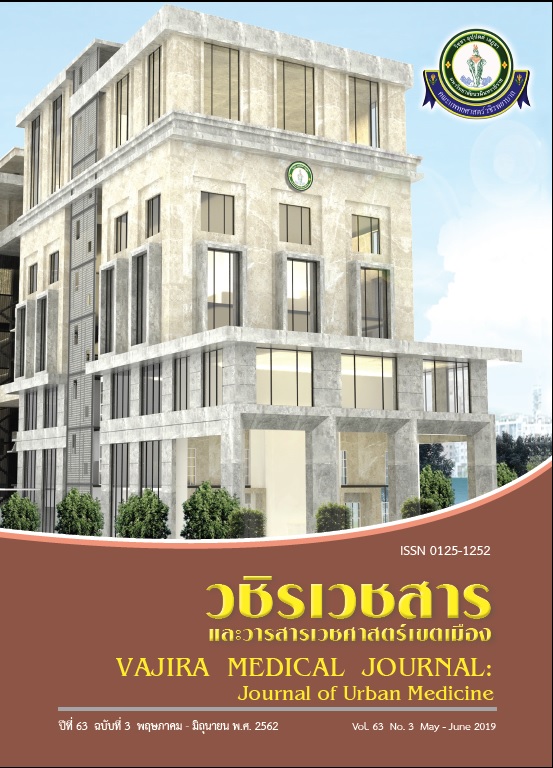Effects of Breathing Training during Hemodialysis on Respiratory Muscle Strength and Functional Capacity in Patients with Chronic Kidney Disease: A Systematic Review
Main Article Content
Abstract
Objective: To systematically review the effects of inspiratory muscle training during hemodialysis on respiratory muscle strength and functional capacity in patients with chronic kidney disease (CKD).
Methods: The literature searched on six international databases included PEDro, The Cochrane Library, Science Direct, Pubmed, CINAHL and Thai database (i.e., TCI) from 2007 to October 2017 in both English and Thai languages. The inclusion criteria were clinical trial. Participants were > 18 years old both males and females who received hemodialysis. The study focused on the effects of breathing training during hemodialysis on respiratory muscle strength and functional capacity. Kappa score was used to measure the agreement of two independent reviewers and Cochrane risk of bias was used to test the quality assessment.
Results: It has been reported that inspiratory muscle training in CKD patients could increase in respiratory muscle strength and thereby increase in functional capacity. However, no systematically reviews have been reported the effect of inspiratory muscle training on respiratory muscle strength and functional capacity. A total of 184 studies, only four studies were included in this review. A total number of the participants was consisted of 157; aged 18-71 years old. A threshold loading (i.e., power breath) was commonly used for the inspiratory muscle training (IMT), with a loading from 30 to 50% of the maximal inspiratory pressure (MIP) and during 6 weeks to 6 months. It appears that four studies have been totally differences in load training and training session. Two studies used IMT from 30%to 40% of MIP and found that only MIP was improved. One study used IMT at 40% of MIP and found that only six minute walk test (6MWT) was improved. One study used 50% of MIP. After training, MIP and 6MWT were improved significantly.
Conclusion: The effects of respiratory muscle training are inconsistent findings, probably because of differences in load training and duration of the respiratory muscle training or a few of studies.
Downloads
Article Details
References
2. K/DOQI Clinical practice guidelines for chronic kidney disease: Evaluation, classification, and stratification. Am J Kidney Dis 2002;39 (2 Suppl 1):715-30.
3. Tavana S. Effect of dialysis on maximum inspiratory and expiratory pressures in end stage renal disease patients. Tanaffos 2015;14(2):128-33.
4. Figueiredo PHS, Lima MMO, Costa HS, Gomes RT, Neves CDC, Oliveira ESd, et al. The role of the inspiratory muscle weakness in functional capacity in hemodialysis patients. PLoS ONE2017;12(3):1-12.
5. Figueiredo RR, Castro AM, Napoleone MG, Faray L, de Paula Junior AR, Osorio L. Respiratory biofeedback accuracy in chronic renal failure patients: a method comparison. Clin Rehabil 2012;26(8):724–32.
6. Medeiros AI, Fuzari HK, Rattes C, Brandao DC, Marinho PE. Inspiratory muscle training improves respiratory muscle strength, functional capacity and quality of life in patients with chronic kidney disease: a systematic review. J Physiother 2017;63(2): 76–83.
7. Soares V, Vieira MF, Bizinotto T, Silva MS. Inspiratory muscle training improves strength and self-related QOL in hemodialysis patients 2014;1–135.
8. Pellizzaro CO, Thome FS, Veronese FV. Effect of peripheral and respiratory muscle training on the functional capacity of hemodialysis Patients. Ren Fail 2013; 35(2):189–97.
9. Silva VG, Amaral C, Monteiro MB, Nascimento DM, Boschetti JR. Effects of inspiratory muscle training in hemodialysis patients. J Bras Nefrol 2011;33:45-51.
10. Weiner P, Ganem R, Zamir D, Zonder H. Specific inspiratory muscle training in chronic hemodialysis. Harefuah 1996;130(2):73-6.
11. Mcconnell A. Respiratory Muscle Training. Oxford: Churchill Livingstone, 2013.


